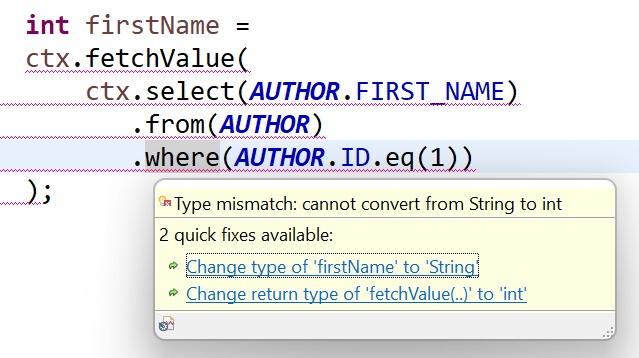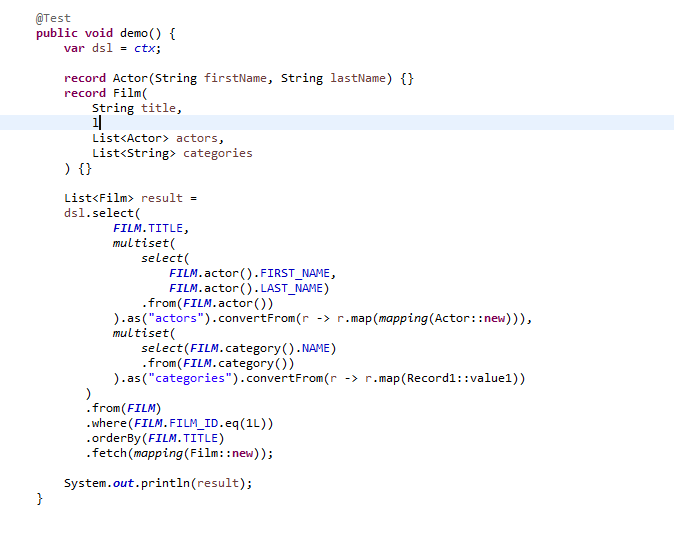AI prompts
base on jOOQ is the best way to write SQL in Java jOOQ
====
jOOQ is an internal DSL and source code generator, modelling the SQL language as a type safe Java API to help you write better SQL.
Its main features include:
- [The source code generator](https://blog.jooq.org/why-you-should-use-jooq-with-code-generation/)
- The [DSL API for type safe query construction](https://www.jooq.org/doc/latest/manual/sql-building/dsl-api/) and [dynamic SQL](https://www.jooq.org/doc/latest/manual/sql-building/dynamic-sql/)
Secondary features include:
- [DAOs](https://www.jooq.org/doc/latest/manual/sql-execution/daos/)
- [Data export](https://www.jooq.org/doc/latest/manual/sql-execution/exporting/) and [import](https://www.jooq.org/doc/latest/manual/sql-execution/importing/)
- [Data type conversion](https://www.jooq.org/doc/latest/manual/sql-execution/fetching/data-type-conversion/)
- [DDL statement support](https://www.jooq.org/doc/latest/manual/sql-building/ddl-statements/)
- [DML statement support](https://www.jooq.org/doc/latest/manual/sql-building/sql-statements/)
- [Diagnostics](https://www.jooq.org/doc/latest/manual/sql-execution/diagnostics/)
- [Dialect agnosticity for 30+ RDBMS](https://www.jooq.org/download/#databases)
- [Embedded types](https://www.jooq.org/doc/latest/manual/code-generation/codegen-embeddable-types/)
- [Formatting and pretty printing](https://www.jooq.org/doc/latest/manual/sql-building/queryparts/pretty-printing/)
- [Implicit joins](https://www.jooq.org/doc/latest/manual/sql-building/sql-statements/select-statement/implicit-join/)
- [Kotlin support](https://www.jooq.org/doc/latest/manual/sql-building/kotlin-sql-building/)
- [Mapping](https://www.jooq.org/doc/latest/manual/sql-execution/fetching/recordmapper/)
- [Meta data API](https://www.jooq.org/doc/latest/manual/sql-execution/meta-data/)
- [Mocking API for JDBC](https://www.jooq.org/doc/latest/manual/sql-execution/mocking-connection/)
- [Model API for use in traversal and replacement](https://www.jooq.org/doc/latest/manual/sql-building/model-api/)
- [`MULTISET` and `ROW` nested collections and records](https://blog.jooq.org/jooq-3-15s-new-multiset-operator-will-change-how-you-think-about-sql/)
- [Multitenancy](https://www.jooq.org/doc/latest/manual/sql-building/dsl-context/custom-settings/settings-render-mapping/)
- [Parser (and translator)](https://www.jooq.org/doc/latest/manual/sql-building/sql-parser/)
- [Pattern based transformation](https://www.jooq.org/doc/latest/manual/sql-building/queryparts/sql-transformation/transform-patterns/)
- [Plain SQL templating](https://www.jooq.org/doc/latest/manual/sql-building/plain-sql-templating/)
- [Policies](https://www.jooq.org/doc/latest/manual/sql-building/queryparts/policies/)
- [Procedural logic API](https://blog.jooq.org/vendor-agnostic-dynamic-procedural-logic-with-jooq/)
- [Reactive support via R2DBC](https://www.jooq.org/doc/latest/manual/sql-execution/fetching/reactive-fetching/)
- [Readonly columns](https://www.jooq.org/doc/latest/manual/code-generation/codegen-advanced/codegen-config-database/codegen-database-readonly-columns/)
- [Scala support](https://www.jooq.org/doc/latest/manual/sql-building/scala-sql-building/)
- [Schema diff](https://www.jooq.org/doc/latest/manual/sql-building/schema-diff/)
- [SQL transformation](https://www.jooq.org/doc/latest/manual/sql-building/queryparts/sql-transformation/)
- [SQL translation](https://www.jooq.org/translate/)
- [Stored procedure support](https://blog.jooq.org/the-best-way-to-call-stored-procedures-from-java-with-jooq/)
- [Transaction API](https://www.jooq.org/doc/latest/manual/sql-execution/transaction-management/)
- [UpdatableRecords for simplified CRUD, with opt-in optimistic locking](https://www.jooq.org/doc/latest/manual/sql-execution/crud-with-updatablerecords/simple-crud/)
- And much more
Examples
========
Typesafe, embedded SQL
----------------------
jOOQ's main feature is typesafe, embedded SQL, allowing for IDE auto completion of SQL syntax...

... as well as of schema meta data:

This allows for preventing errors of various types, including typos of identifiers:

Or data type mismatches:

[The examples are from the code generation blog post](https://blog.jooq.org/why-you-should-use-jooq-with-code-generation/).
A more powerful example using nested collections
------------------------------------------------
For many more examples, [please have a look at the demo](https://github.com/jOOQ/demo). A key example showing jOOQ's various strengths is from the [`MULTISET` operator announcement blog post](https://blog.jooq.org/jooq-3-15s-new-multiset-operator-will-change-how-you-think-about-sql/):
Given these target DTOs:
```java
record Actor(String firstName, String lastName) {}
record Film(
String title,
List<Actor> actors,
List<String> categories
) {}
```
You can now write the following query to fetch films, their nested actors and their nested categorise in a single, type safe query:
```java
List<Film> result =
dsl.select(
FILM.TITLE,
multiset(
select(
FILM.actor().FIRST_NAME,
FILM.actor().LAST_NAME)
.from(FILM.actor())
).as("actors").convertFrom(r -> r.map(mapping(Actor::new))),
multiset(
select(FILM.category().NAME)
.from(FILM.category())
).as("categories").convertFrom(r -> r.map(Record1::value1))
)
.from(FILM)
.orderBy(FILM.TITLE)
.fetch(mapping(Film::new));
```
The query is completely type safe. Change a column type, name, or the target DTO, and it will stop compiling! Trust only your own eyes:

And here you see the nested result in action from the logs:

How does it work? Look at this annotated example:
```java
List<Film> result =
dsl.select(
FILM.TITLE,
// MULTISET is a standard SQL operator that allows for nesting collections
// directly in SQL. It is either
// - supported natively
// - emulated using SQL/JSON or SQL/XML
multiset(
// Implicit path based joins allow for simpler navigation of foreign
// key relationships.
select(
FILM.actor().FIRST_NAME,
FILM.actor().LAST_NAME)
// Implicit correlation to outer queries allows for avoiding repetitive
// writing of predicates.
.from(FILM.actor())
// Ad-hoc conversion allows for mapping structural Record2<String, String>
// types to your custom DTO using constructor references
).as("actors").convertFrom(r -> r.map(mapping(Actor::new))),
multiset(
select(FILM.category().NAME)
.from(FILM.category())
).as("categories").convertFrom(r -> r.map(Record1::value1))
)
.from(FILM)
.orderBy(FILM.TITLE)
.fetch(mapping(Film::new));
```
The generated SQL query might look like this, in PostgreSQL:
```sql
select
film.title,
(
select coalesce(
jsonb_agg(jsonb_build_object(
'first_name', t.first_name,
'last_name', t.last_name
)),
jsonb_build_array()
)
from (
select
alias_78509018.first_name,
alias_78509018.last_name
from (
film_actor
join actor as alias_78509018
on film_actor.actor_id = alias_78509018.actor_id
)
where film_actor.film_id = film.film_id
) as t
) as actors,
(
select coalesce(
jsonb_agg(jsonb_build_object('name', t.name)),
jsonb_build_array()
)
from (
select alias_130639425.name
from (
film_category
join category as alias_130639425
on film_category.category_id = alias_130639425.category_id
)
where film_category.film_id = film.film_id
) as t
) as categories
from film
order by film.title
```
This particular example is explained more in detail in the [`MULTISET` operator announcement blog post](https://blog.jooq.org/jooq-3-15s-new-multiset-operator-will-change-how-you-think-about-sql/). For many more examples, [please have a look at the demo](https://github.com/jOOQ/demo).
", Assign "at most 3 tags" to the expected json: {"id":"5033","tags":[]} "only from the tags list I provide: [{"id":77,"name":"3d"},{"id":89,"name":"agent"},{"id":17,"name":"ai"},{"id":54,"name":"algorithm"},{"id":24,"name":"api"},{"id":44,"name":"authentication"},{"id":3,"name":"aws"},{"id":27,"name":"backend"},{"id":60,"name":"benchmark"},{"id":72,"name":"best-practices"},{"id":39,"name":"bitcoin"},{"id":37,"name":"blockchain"},{"id":1,"name":"blog"},{"id":45,"name":"bundler"},{"id":58,"name":"cache"},{"id":21,"name":"chat"},{"id":49,"name":"cicd"},{"id":4,"name":"cli"},{"id":64,"name":"cloud-native"},{"id":48,"name":"cms"},{"id":61,"name":"compiler"},{"id":68,"name":"containerization"},{"id":92,"name":"crm"},{"id":34,"name":"data"},{"id":47,"name":"database"},{"id":8,"name":"declarative-gui "},{"id":9,"name":"deploy-tool"},{"id":53,"name":"desktop-app"},{"id":6,"name":"dev-exp-lib"},{"id":59,"name":"dev-tool"},{"id":13,"name":"ecommerce"},{"id":26,"name":"editor"},{"id":66,"name":"emulator"},{"id":62,"name":"filesystem"},{"id":80,"name":"finance"},{"id":15,"name":"firmware"},{"id":73,"name":"for-fun"},{"id":2,"name":"framework"},{"id":11,"name":"frontend"},{"id":22,"name":"game"},{"id":81,"name":"game-engine "},{"id":23,"name":"graphql"},{"id":84,"name":"gui"},{"id":91,"name":"http"},{"id":5,"name":"http-client"},{"id":51,"name":"iac"},{"id":30,"name":"ide"},{"id":78,"name":"iot"},{"id":40,"name":"json"},{"id":83,"name":"julian"},{"id":38,"name":"k8s"},{"id":31,"name":"language"},{"id":10,"name":"learning-resource"},{"id":33,"name":"lib"},{"id":41,"name":"linter"},{"id":28,"name":"lms"},{"id":16,"name":"logging"},{"id":76,"name":"low-code"},{"id":90,"name":"message-queue"},{"id":42,"name":"mobile-app"},{"id":18,"name":"monitoring"},{"id":36,"name":"networking"},{"id":7,"name":"node-version"},{"id":55,"name":"nosql"},{"id":57,"name":"observability"},{"id":46,"name":"orm"},{"id":52,"name":"os"},{"id":14,"name":"parser"},{"id":74,"name":"react"},{"id":82,"name":"real-time"},{"id":56,"name":"robot"},{"id":65,"name":"runtime"},{"id":32,"name":"sdk"},{"id":71,"name":"search"},{"id":63,"name":"secrets"},{"id":25,"name":"security"},{"id":85,"name":"server"},{"id":86,"name":"serverless"},{"id":70,"name":"storage"},{"id":75,"name":"system-design"},{"id":79,"name":"terminal"},{"id":29,"name":"testing"},{"id":12,"name":"ui"},{"id":50,"name":"ux"},{"id":88,"name":"video"},{"id":20,"name":"web-app"},{"id":35,"name":"web-server"},{"id":43,"name":"webassembly"},{"id":69,"name":"workflow"},{"id":87,"name":"yaml"}]" returns me the "expected json"